

Two eras of the internet: pull and push. The evolution of the internet is an extremely complex topic.
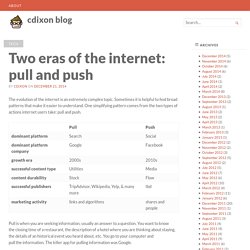
Sometimes it is helpful to find broad patterns that make it easier to understand. One simplifying pattern comes from the two types of actions internet users take: pull and push. Pull is when you are seeking information, usually an answer to a question. You want to know the closing time of a restaurant, the description of a hotel where you are thinking about staying, the details of an historical event you heard about, etc. You go to your computer and pull the information. Search grew exponentially in its heyday (roughly, the decade of the 2000s) because it benefited from a positive feedback loop between the supply of and the demand for information. Push is when you are using the internet in a more passive way and content comes to you. We are currently experiencing a positive feedback loop between social networks and media publishers, analogous to last decade’s search + information feedback loop. 1) Desktop vs mobile.
How to Be an Expert in a Changing World. December 2014 If the world were static, we could have monotonically increasing confidence in our beliefs.
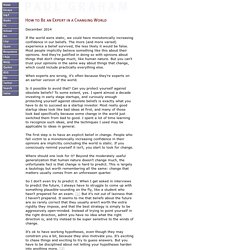
The more (and more varied) experience a belief survived, the less likely it would be false. Most people implicitly believe something like this about their opinions. And they're justified in doing so with opinions about things that don't change much, like human nature. But you can't trust your opinions in the same way about things that change, which could include practically everything else. When experts are wrong, it's often because they're experts on an earlier version of the world.
Is it possible to avoid that? The first step is to have an explicit belief in change. Where should one look for it? So I don't even try to predict it. It's ok to have working hypotheses, even though they may constrain you a bit, because they also motivate you. I believe this passive m.o. works not just for evaluating new ideas but also for having them. Notes. The importance of optionality - StartupCFO. It seems like there is no end to the supply of venture capital these days.
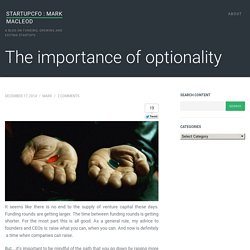
Funding rounds are getting larger. The time between funding rounds is getting shorter. For the most part this is all good. As a general rule, my advice to founders and CEOs is: raise what you can, when you can. And now is definitely a time when companies can raise. But…it’s important to be mindful of the path that you go down by raising more and more capital. CBinsights recently reported a huge increase in the number of companies that have raised $3M *before* their Series A. Ee, this trend is not specific to 2014. Maybe it’s just semantics, but in my books a company that has raised multiple millions of $ is definitely post ‘seed’. Back when I was a seed VC my view was that my seed investments were not even companies. The importance of optionality Strategy is ultimately about choices: what you choose to do and as a result, what you choose not to do.
Putting this into practice… The Venture Capitalist Struggle — Bonanzinga @ Entrepreneurship at Work (European view) In the startup community, we often hear and read a lot about the entrepreneurial struggle — the daily difficulties and challenges facing those building companies.
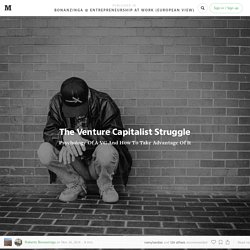
Rarely, however, do we hear about the other side of the equation — the investor struggle. Although it may appear that the life of an investor is a charmed one filled with great travel, luxury hotel and amazing conferences that couldn’t be farther from the truth. When you ask any VC how it is going you always get the same answer: amazing.
Company XYZ is a home run! There is a sort of unwritten law that if you are a venture capitalist you cannot perpetrate any fear, any weakness or hesitation. There is a long often tedious path that a VC must go down, in order to successfully sign a term sheet and/or have the opportunity to invest in a company. Things for any entrepreneurs to keep in mind… End of the year startup checklist. I call the last working week in December Board Week because it’s packed with board meetings.
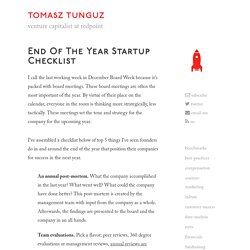
These board meetings are often the most important of the year. By virtue of their place on the calendar, everyone in the room is thinking more strategically, less tactically. These meetings set the tone and strategy for the company for the upcoming year. I’ve assembled a checklist below of top 5 things I’ve seen founders do in and around the end of the year that position their companies for success in the next year. An annual post-mortem. For startups, founders and VCs, the end of the year is a good time for introspection, evaluation and communication.